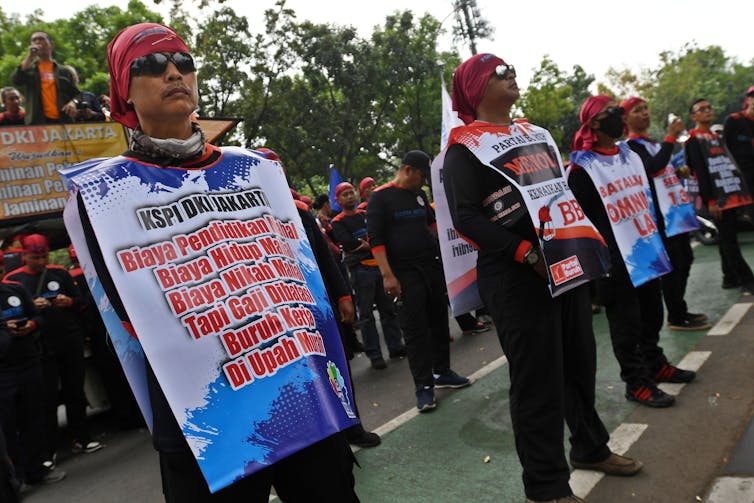Just weeks ago, Indonesia’s government changed its controversial Job Creation Law – better known as the Omnibus Law – into a “Government Regulation in Lieu of Law” as it was considered an emergency to issue the regulation.
It was a sudden manoeuvre to bypass Indonesia’s Constitutional Court ruling stating the law was unconstitutional in 2021. The 2021 verdict gave the government two years to adjust the controversial law. By changing it into an emergency regulation, Indonesia government evades the possibility of the law being fully annulled.
Passed in late 2020, the Omnibus Law attracted much criticism for neglecting labour rights. Numerous protests by workers, activists and civil society organisations coloured Indonesia’s employment landscape after the issuance of the law. This situation will likely continue in 2023 and the election year of 2024.
Problematic provisions
The Omnibus Law embodies President Joko Widodo’s ambition to attract foreign investors by slashing red tape at the cost of employees’ rights.
The law made it easier for businesses to lay off employees without prior notice. No provision regulated work safety. Severance pay was lowered and temporary contracts for workers were lengthened. Its new formula to determine minimum wage also came under fire and resulted in the historically lowest annual wage increase ever in 2022.
The “new” emergency regulation – in place of the Omnibus Law that should have been annulled by now – is arguably even more problematic.
First, the majority of its provisions are simply a copy of the Omnibus Law. Many of the previous Omnibus Law’s problematic provisions still exist in this new regulation.
Second, several changes and additional provisions in the new regulation are confusing and overlap with previous government regulations, which are derivatives from the Omnibus Law.
For example, the provisions on outsourcing, which were erased in the Omnibus Law, now reappeared in the emergency regulation. The regulation also changed the minimum wages formulations again, making both the workers’ and the employers’ sides furious with its inconsistency.
This Government Regulation in Lieu of Law also still leaves so many unelaborated points that could be further exploited in the future, and are hard to understand even by law experts.
How workers are protesting the changes
Due to its problematic content and the fact that the Omnibus Law was passed so suddenly in 2020, without proper consultation with workers, it has drawn heavy criticism from trade unions and workers.
However, as Indonesia’s industrial action has always been very restrictive, launching strikes is out of the questions. Strikes are not very popular as an industrial action in Indonesia because they can only be organised with permission from the companies. Companies also have the right to cut their workforce if the labourers choose to carry out informal strikes.
This situation leaves workers to resort only to protests. However, the pandemic has made it impossible for them to mobilise protests under strict mobility and mass gathering restrictions.
But these past few years showed workers did not sit still. Instead, they revolutionised how they staged protests and shifted to social media. While this might not be enough to push the government to change the Law, at the very least, a few viral tweets helped push several businesses to change their practices after abusing their employees.

ANTARA FOTO/Aditya Pradana Putra/nz
By the second half of 2022, thousands of workers staged protests in their respective cities. The demonstrations got more intense as the government raised subsidised fuel prices in September. The fuel price hike boosted the already high inflation due to rising food prices.
One of the workers’ demand is for the government to not used the minimum wage formulations stipulated in the Job Creation Law. This demand actually met with success, as the government decided to issue a separate regulation to determine the 2023 minimum wage.
The other demand from the workers is of course to push the government to revoke the Omnibus Law. This one clearly has failed, as shown by the passing of the emergency regulation in favour of investors.
In 2023, it will be imperative to see how workers take action to counter the regulation, especially amid possible massive layoffs due to a global recession.




